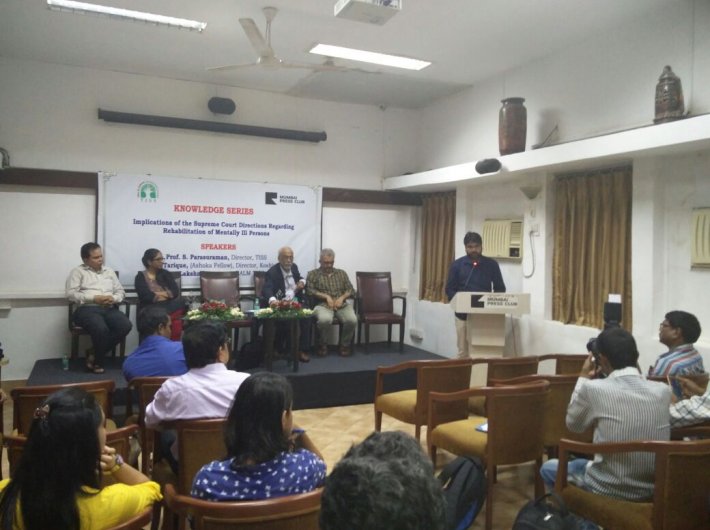Mental healthcare activists join in an interactive session on the implication of SC directions on rehabilitation of mentally ill persons
As many as 50 million people suffer from mental illnesses in India – only 10% people with common mental disorders and only 40%-50% people with serious disorders like schizophrenia and bipolar disorder; receive any form of health care.
In February 2017, the supreme court, in a PIL, directed the centre to frame a policy for the rehabilitation of people who have been cured of their mental illnesses, but continue to live in mental hospitals. On July 10, the apex court ordered all states and union territories to implement the guidelines formulated by the centre and file the status report in a year’s time.
Mental healthcare activists however are concerned that the guidelines come from the committee that was constituted as a result of the SC’s order and not from the government, which only acted after the order.
As per committee estimates, around 10,000 persons need to be rehabilitated. On the ground, activists fear that with the SC’s direction for filing a status report, there is a possible danger of states attempting to bring down the numbers by shifting the identities or the institutions instead of effective rehabilitation. Most states would be unfamiliar with the social care model recommended by the committee.
People are forced to live in the hospitals for years even after having recovered. This is an indicator of the larger system failure to respond effectively to mental healthcare needs in the country, said S Parasuraman, director, Tata Institute of Social Sciences (TISS) at an interactive session on ‘Implication of supreme court directions regarding rehabilitation of mentally ill persons’ at Press Club, Mumbai.
Sharing his on the ground experience, Mohammed Tarique, director, TISS project ‘Koshish’ said, “Homelessness and mental illnesses have a serious probability of getting criminalised in the name of preventing beggary in the country. Most beggar homes across the country are actually housing mentally ill patients. The beggary law provides for round-ups and raids on a range of vulnerable groups on the streets including those with mental illnesses and those who are abandoned – they are arrested and tried for the offence of beggary. Often such persons continue to live in government run custodial institutions for years.”
Koshish project works towards treatment of mentally ill persons, their subsequent release from the institution after recovery and reintegration into the family and community. It is currently running in Mumbai, Delhi and Bihar in collaboration with state governments. It has so far brought out 40,000 people out of beggar homes.
Tarique said that anti-beggary legislation needs to be urgently repealed as the law provides for the arrest of persons with mental illnesses. “Since the person is taken into custody as an offender and not as a patient, there is very little possibility of him/her getting the treatment. Such persons will never feature in any status report or the assessment of the hospitals, he added.
Activists said that extended period of confinement ranging from 5-20 years in custodial institutions results in compromised quality of life, poor mental health outcomes and high disability burden. Hospitals compromise their intended roles as specialist centres and the rights of people with mental illness to live a life of their choice.
Dr Lakshmi Ravikant of TISS ‘Banyan Academy of Leadership in Mental Health’ programme said in that their ‘Home Again’ initiative, 166 mentally challenged women in Tamil Nadu, Kerala and Assam, were treated by giving them the option to live with other treated patients in a home with a health worker who will look after their needs. While some began working again, others spent their day pursuing their hobbies.
“When we compared these women with those still in institutional care, we found that development in the former was more. They participated in the community and coped better with the disability,” she added.
For holistic mental healthcare practitioners, the recent notification of progressive laws in both disability and mental health by the centre in consonance with the United Nations Convention on Rights of Persons with Disabilities (UNCRPD) offer an emphasis on rights, social security, access to services and equitable living in society. The apex court order along with The National Mental Health Care Act 2017 should be seen as an opportunity to build a robust care system for persons with mental illnesses.
“While the order is undoubtedly a welcome step, there is more that needs to be done if we really wish to have caring and enabling environment for persons with mental illnesses and facilitate their rehabilitation” summed up Parasuraman.



